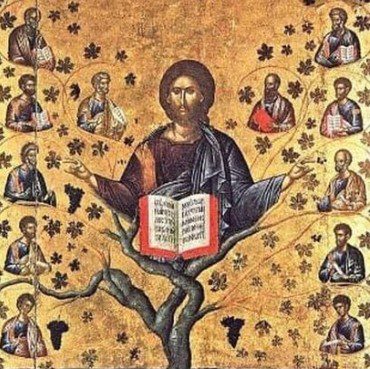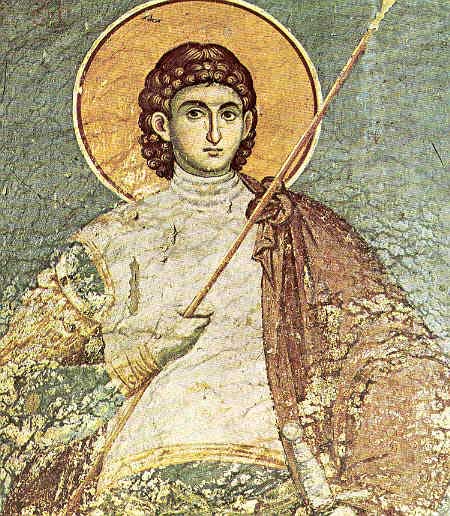By prof. A. P. Lopukhin
18:28. They led Jesus from Caiaphas to the Praetorium. It was dawn; and they did not enter into the praetorium, lest they should defile themselves, that they might eat the passover.
Evangelist John does not write anything about the trial of Christ in the house of Caiaphas, since the synoptic accounts of this event were sufficiently familiar to the readers. He goes directly to a description of the trial of Christ under Pilate.
“It was morning.” It was morning, that is. it was already day (cf. Luke 22:66), about 6 o’clock in the morning.
“in the praetorium.” Christ was taken to the Praetorium, i.e. in the former palace of Herod the Great, where the Roman procurators usually stayed when they came to Jerusalem. From this palace, which was located in the western part of the city, the so-called David’s Tower is still preserved.
The Evangelist notes that the Jews did not enter the Praetorium in order not to defile themselves and to keep themselves clean for the tasting of the Passover. In the home of the pagan Pilate there was leavened bread, and the Jews on the eve of the Passover, on Nisan 13, were obliged to remove from their homes everything that was leavened (Bazhenov, p. 127), as not corresponding to the purity that the Jews were obliged to keep during the Passover.
“so that they may eat the passover” What does this expression mean? Has not the Passover been accomplished yet? It is clear from the Synoptic Gospels that Christ and His disciples had already celebrated the Passover (cf. Matt. 26:17 et seq.) How could it happen that the Jews who brought Christ to Pilate had not yet did the passover? Interpreters give different answers to this question.
Some (e.g. Lambert, The Passover. Journal of Theological Studies, 1903) maintain that among the Jews there was no fixed time for the observance of the Passover, and that Christ observed the Passover at the usual time, while the Jews in question, guided by according to their more accurate calendar calculations, they celebrated Passover a day later than the common people in that year.
Prof. Hvolson (The Last Passover Supper of Jesus Christ. – Christ’s Reading, 1875 and 1878) adds that Christ did perfectly right to celebrate the Passover on Nisan 13, because in the year of Jesus Christ’s death Nisan 14 coincided with Friday, on which it was forbidden to slay the Passover lamb. Therefore, the slaughter of the Passover lamb was postponed for all Jews for 13, i.e. for Thursday night. But the law said that the paschal lamb was to be eaten until morning, and nothing else; the number of that morning was not specified, and Christ, like many other Jews, ate the lamb on the same day it was slain, namely the 13th, while the representatives of the Jews thought it more appropriate to eat the lamb the next day , i.e. at 14 in the evening.
Others (most notably Tsang) try to prove that the verse in question does not refer to the eating of the Passover lamb. The expression “to eat the Passover” means the tasting of the sacrifice which was offered on the morrow of the Passover, the 15th of Nisan (this is the so-called “Haggigah”), and the tasting of the unleavened bread (Kommentar 3. Evangelium des Johannes, S. 621 ff.).
Finally, many of the more recent interpreters (e.g., Loisy, Julicher, etc.) believe that John deliberately deviates here from the correct chronology of the Synoptics in order to convey the idea that our Passover lamb is Christ. According to the description of his Gospel, Christ died on the day and hour when according to the law the Passover lamb was slain.
Of the mentioned explanations, the first seems the most plausible, according to which in the year of Christ’s death, some Jews celebrated Passover on the 13th and others on the 14th of Nisan. Accepting this explanation, confirmed by the calculations of such a connoisseur of Jewish archeology as Prof. Hvolson, we can understand why, on the day after Christ’s tasting of the Passover, the members of the Sanhedrin found it possible to organize the trial and execution of Christ, why Simon of Cyrene only now he returns from work (Mark 15:21) and the women prepare incense (Luke 23:56) and why Joseph of Arimathea finds where to buy a shroud (Mark 15:46). For many, the holiday had not yet begun, and the various shops with goods were still open.
The tradition of the Christian Church also confirms the plausibility of such an explanation. For example, St. Clement of Alexandria directly says that God performed the Passover on Nisan 13 – a day earlier than the legal term (at Bazhenov p. 126). And in the Christian churches of the East in ancient times, until the end of the second century, they celebrated the Passover on the 14th of Nisan, dedicating it to the commemoration of the day of Christ’s death, and therefore they assumed that Christ performed the Passover on the 13th of Nisan.
Finally, Jewish tradition also reports that Jesus was crucified on the eve of the Passover (ibid., p. 135).
Therefore, we have sufficient reason to assert that the evangelist John more accurately determines the chronological sequence here than the synoptics, where things are presented as if Christ ate the passover on the same day as all the Jews.
18:29. Then Pilate came out to them and said: What do you accuse this Man of?
Condescending to the prejudices of the Jews, Pilate went out to them from the palace and stopped on the landing of the stairs that led to the palace. Although he was already known about Christ when the members of the Sanhedrin asked him for a military force to capture Christ in the garden (that Pilate knew about Christ, the account of Pilate’s wife’s dream, Matt. 27:19, testifies), regardless of this, according to the custom of Roman judicial proceedings, Pilate turned to the Jews with a demand that they should accurately formulate their accusation.
18:30. They answered him and said: if He had not been an evildoer, we would not have delivered Him to you.
However, the Jews did not want Pilate to judge a case that they had already decided. According to them, it should be enough for him that they condemned Christ as a villain. All that remained for Pilate to do was to pronounce upon Him the sentence whereby He should be executed.
18:31. Pilate said to them: you take Him and judge Him according to your law. The Jews said to him: it is not lawful for us to kill anyone;
“take Him ye.” Pilate first kept his judicial dignity and refused to do what the Jews asked of him, i.e. to pass judgment on the basis of a wrongful conviction. If the Jews – he thinks – do not recognize his right to judge, let them judge Christ themselves.
“we’re not allowed.” Then the Jews admitted that they had come to Pilate to obtain a sentence of death for Christ, since they themselves had no right to pass such sentences. If they did subsequently execute Archdeacon Stephen under Pontius Pilate (Acts 7), it was done illegally, during a time of popular unrest.
18:32. that the word of Jesus might be fulfilled, which he had spoken when he made it clear what kind of death he would die.
The insistence of the Jews that Pilate should pronounce judgment on Christ, and on the other hand the weakness that Pilate later shows towards them, were to serve to fulfill Christ’s prediction about what kind of death he would die (John 7:32ff. ). If Pilate had resolutely refused to judge Christ and had insisted on his first decision (verse 31), the angry Jews would have executed Christ themselves, but they would have simply stoned Him to death as a blasphemer from their point of view, and thus the prophecy would not have been fulfilled of Christ, that they will raise Him from the earth – that is, on the cross (see the interpretation of John 3:14 and 12:32). Only with the condemnation of Christ by a Roman court was He to be crucified.
18:33. Then Pilate again entered the praetorium and called Jesus and said to him: Are you the King of the Jews?
From the evangelist John it is not clear why Pilate, having called Jesus into the praetorium, asked him: “Are you the King of the Jews?” But from the Gospel of Luke we learn that this question was preceded by an accusation against Christ by the Jews that stirs up the people, calling himself the King of the Jews (Luke 23:2). Pilate, of course, cannot help but remember that he himself gave soldiers to arrest Jesus. Under the influence of the Jewish accusations, he could come to the idea that under the mask of a teacher of religion in the person of Jesus hides a rebel of the people against the Roman rule.
18:34. Jesus answered him: are you speaking this from yourself, or did others tell you about me?
Christ does not directly answer Pilate’s question, but Sam asks him. Let Pilate say what prompted him to ask Christ if he was the king of the Jews? The answer that Christ will give him will also depend on the clarification of Pilate’s motive. It must be answered in one way if the question is asked from the point of view of a Roman, in another way if Pilate repeats the opinion of the Jews.
18:35. Pilate answered: Am I a Jew? Your people and the high priests betrayed You to me; what have you done
Pilate denies any connection to his question with the Jewish opinion of Christ as king. For him personally, there can be no question whether the man in front of him is a king or not. This wretched Jesus, a man without any outward signs of royal majesty, is certainly no king! The thought of the royal dignity of such a wretched man could only occur to a Jew carried away by his religious dreams. “Am I a Jew?” asks Pilate. So, if he put this question to Christ, it was not of himself; he only repeated what he had heard from the Jews. As a prosecutor, he is obliged to investigate the complaint against Christ. “What hast thou done?” That is, by what acts havest thou given occasion to the Jews to accuse thee of plotting to acquire kingly power?
18:36. Jesus answered: My kingdom is not of this world: if My kingdom were of this world, My servants would fight that I should not be handed over to the Jews; but now My kingdom is not from here.
Christ answers Pilate that for him, as a representative of the Roman authority, the authority to which Christ asserts His rights poses no danger. Christ’s kingdom or power is not of this world. It is of heavenly origin (cf. John 3:5) and must be established on earth by means different from those by which earthly kingdoms are usually founded and established: Christ has no strong supporters who could carry out a political coup in His benefit. The very delivery of Christ to the Jews could not have been effected without strong opposition on the part of His adherents, if He had had enough of them.
18:37. And Pilate said to Him: so, are You a king? Jesus answered: you say that I am a king. This is why I was born, and this is why I came into the world to testify to the truth; everyone who is of the truth hears My voice.
“So, are you a king?” Pilate realized that Christ had no intention of behaving as a pretender to the Jewish throne. But at the same time he heard that Christ did not give up the idea that he was King. That is why he asks Him: “So, are You a king?” (better translated: “yet you are king”). Perhaps by this question Pilate wanted to make Christ realize that he had better not press his claim to some unknown kingdom that did not belong to this world.
“you say”. Christ answers in the affirmative: “You say” (cf. Christ’s answer to Judas at the Last Supper: “You said” in Matt. 26:25. The expression “you said” as an affirmation is used except in the above verse of chapter 26 of Matthew, also in verse 64 of the same chapter.).
“that”. At the same time, Christ substantiates His affirmative answer with an expression of His self-awareness: “because” (this is how it is more correct to translate the particle ὅτι standing here, translated in the Russian text with the conjunction “che”).
“I am king”. But to make the character of His kingdom better clear to Pilate, Christ now gives a positive description of the Kingdom (previously, in verse 36, only a negative definition of Christ’s kingdom was given). Christ was born, i.e. “proceeded from the Father” (cf. John 16:28) and came into the world, i.e. he appeared in the world not to gain power over people by ordinary earthly means, but to bear witness to the truth, and by preaching the truth to gain subjects for it. The truth that Christ has in mind here is the divine, spiritual, saving truth (cf. John 1:17, 3:11, 32), the true knowledge and revelation of God, which is given by God to men in Christ Himself (cf. John 14:6). Such subjects are to be found not only among the Jews, but also among all nations: anyone who has not lost his desire for the truth, therefore even the heathen Pilate, can understand Christ, the preacher of truth. In this way, Christ extends a hand to Pilate to guide him to the true path, inviting him to familiarize himself with His teaching.
18:38. Pilate said to Him: what is truth? And having said this, he went out again to the Jews and said to them: I find no fault in Him.
Pilate obviously belonged to those Romans who had already lost faith in the existence of truth. He was a skeptical clerk, indifferent to the truth, who was used to seeing only lies, insincerity, and utter contempt for the demands of justice. In his time, bribery and venality reigned in Rome, everyone tried to get rich, and did not consider the means. Philosophy justified this course of action by asserting that there is nothing true in the world: “only this is true – said Pliny – that there is nothing true”. That is why Pilate does not want to hear anything about the truth. “What is truth?”, i.e. truth is only a dream. Is it worth fighting for, going to death for? And Pilate, not expecting an answer (for what could this, in his opinion, an enthusiastic dreamer, answer him?), went out to the Jews and told them that he had found no reason to punish Jesus.
18:39. But you have a custom, that I let you one for Passover; do you want me to release the King of the Jews to you?
What should Pilate do now? Or to demand a more detailed description of the crimes of Christ, or else to take Jesus under his protection. But both the one and the other seemed to him inappropriate: the first, because the Jews had evidently already said all they had to say against Jesus, and the second, because of the danger that the irritated Jews would rebel. That’s why Pilate chose the middle way: let the Jews keep their opinion that Jesus is a criminal, but let them also fulfill the procurator’s wish – that the criminal be pardoned for the holiday. According to their custom, every year at the feast of the Passover they asked for the release of one of those condemned by the Roman authorities. Now Pilate agreed to pardon Jesus, whom he ironically calls the King of the Jews.
18:40. Then they all shouted again, saying: not Him, but Vara’va. Vara’va was a robber.
But the Jews did not accept such a compromise: they asked Pilate to release another criminal for the holiday – the robber Barabbas. John gives the events very briefly. He says that the request for the release of Barabbas was repeated (“again”), and earlier he himself did not mention such a request. It is obvious that he did not wish to convey in detail what had already been described in the synoptics (see Mark 15:6-15; Matt. 27: 15-26), but he could not help but mention the request to release Barabbas : this is necessary to explain Pilate’s further conduct.
Source in Russian: Explanatory Bible, or Commentaries on all the books of the Holy Scriptures of the Old and New Testaments: In 7 volumes / Ed. prof. A. P. Lopukhin. – Ed. 4th. – Moscow: Dar, 2009, 1232 pp.














